MAPK10
Mitogen-activated protein kinase 10 also known as c-Jun N-terminal kinase 3 (JNK3) is an enzyme that in humans is encoded by the MAPK10 gene.[5][6][7]
Function
[edit]The protein encoded by this gene is a member of the MAP kinase family. MAP kinases act as an integration point for multiple biochemical signals, and are involved in a wide variety of cellular processes such as proliferation, differentiation, transcription regulation and development. This protein is a neuronal-specific form of c-Jun N-terminal kinases (JNKs). Through its phosphorylation and nuclear localization, this kinase plays regulatory roles in the signaling pathways during neuronal apoptosis. Beta-arrestin 2, a receptor-regulated MAP kinase scaffold protein, is found to interact with, and stimulate the phosphorylation of this kinase by MAP kinase kinase 4 (MKK4). Cyclin-dependent kinase 5 can phosphorylate, and inhibit the activity of this kinase, which may be important in preventing neuronal apoptosis. Four alternatively spliced transcript variants encoding distinct isoforms have been reported.[7]
Interactions
[edit]MAPK10 has been shown to interact with MAPK8IP3.[8][9][10]
References
[edit]- ^ a b c GRCh38: Ensembl release 89: ENSG00000109339 – Ensembl, May 2017
- ^ a b c GRCm38: Ensembl release 89: ENSMUSG00000046709 – Ensembl, May 2017
- ^ "Human PubMed Reference:". National Center for Biotechnology Information, U.S. National Library of Medicine.
- ^ "Mouse PubMed Reference:". National Center for Biotechnology Information, U.S. National Library of Medicine.
- ^ Gupta S, Barrett T, Whitmarsh AJ, Cavanagh J, Sluss HK, Dérijard B, Davis RJ (July 1996). "Selective interaction of JNK protein kinase isoforms with transcription factors". EMBO J. 15 (11): 2760–70. doi:10.1002/j.1460-2075.1996.tb00636.x. PMC 450211. PMID 8654373.
- ^ Yoshida S, Harada H, Nagai H, Fukino K, Teramoto A, Emi M (November 2002). "Head-to-head juxtaposition of Fas-associated phosphatase-1 (FAP-1) and c-Jun NH2-terminal kinase 3 (JNK3) genes: genomic structure and seven polymorphisms of the FAP-1 gene". J. Hum. Genet. 47 (11): 614–9. doi:10.1007/s100380200094. PMID 12436199.
- ^ a b "Entrez Gene: MAPK10 mitogen-activated protein kinase 10".
- ^ Ito M, Yoshioka K, Akechi M, Yamashita S, Takamatsu N, Sugiyama K, Hibi M, Nakabeppu Y, Shiba T, Yamamoto KI (November 1999). "JSAP1, a novel jun N-terminal protein kinase (JNK)-binding protein that functions as a Scaffold factor in the JNK signaling pathway". Mol. Cell. Biol. 19 (11): 7539–48. doi:10.1128/mcb.19.11.7539. PMC 84763. PMID 10523642.
- ^ Kelkar N, Gupta S, Dickens M, Davis RJ (February 2000). "Interaction of a mitogen-activated protein kinase signaling module with the neuronal protein JIP3". Mol. Cell. Biol. 20 (3): 1030–43. doi:10.1128/MCB.20.3.1030-1043.2000. PMC 85220. PMID 10629060.
- ^ Matsuura H, Nishitoh H, Takeda K, Matsuzawa A, Amagasa T, Ito M, Yoshioka K, Ichijo H (October 2002). "Phosphorylation-dependent scaffolding role of JSAP1/JIP3 in the ASK1-JNK signaling pathway. A new mode of regulation of the MAP kinase cascade". J. Biol. Chem. 277 (43): 40703–9. doi:10.1074/jbc.M202004200. hdl:2297/2692. PMID 12189133.
Further reading
[edit]- Freedman BD, Liu QH, Del Corno M, Collman RG (2003). "HIV-1 gp120 chemokine receptor-mediated signaling in human macrophages". Immunol. Res. 27 (2–3): 261–76. doi:10.1385/IR:27:2-3:261. PMID 12857973. S2CID 32006625.
- Lee C, Liu QH, Tomkowicz B, Yi Y, Freedman BD, Collman RG (2003). "Macrophage activation through CCR5- and CXCR4-mediated gp120-elicited signaling pathways". J. Leukoc. Biol. 74 (5): 676–82. doi:10.1189/jlb.0503206. PMID 12960231. S2CID 11362623.
- Pulverer BJ, Kyriakis JM, Avruch J, Nikolakaki E, Woodgett JR (1991). "Phosphorylation of c-jun mediated by MAP kinases". Nature. 353 (6345): 670–4. Bibcode:1991Natur.353..670P. doi:10.1038/353670a0. PMID 1922387. S2CID 29557176.
- Mohit AA, Martin JH, Miller CA (1995). "p493F12 kinase: a novel MAP kinase expressed in a subset of neurons in the human nervous system". Neuron. 14 (1): 67–78. doi:10.1016/0896-6273(95)90241-4. PMID 7826642. S2CID 14107133.
- Maruyama K, Sugano S (1994). "Oligo-capping: a simple method to replace the cap structure of eukaryotic mRNAs with oligoribonucleotides". Gene. 138 (1–2): 171–4. doi:10.1016/0378-1119(94)90802-8. PMID 8125298.
- Jabado N, Pallier A, Jauliac S, Fischer A, Hivroz C (1997). "gp160 of HIV or anti-CD4 monoclonal antibody ligation of CD4 induces inhibition of JNK and ERK-2 activities in human peripheral CD4+ T lymphocytes". Eur. J. Immunol. 27 (2): 397–404. doi:10.1002/eji.1830270209. PMID 9045910. S2CID 23787450.
- Yang DD, Kuan CY, Whitmarsh AJ, Rincón M, Zheng TS, Davis RJ, Rakic P, Flavell RA (1997). "Absence of excitotoxicity-induced apoptosis in the hippocampus of mice lacking the Jnk3 gene". Nature. 389 (6653): 865–70. Bibcode:1997Natur.389..865Y. doi:10.1038/39899. PMID 9349820. S2CID 4430535.
- Suzuki Y, Yoshitomo-Nakagawa K, Maruyama K, Suyama A, Sugano S (1997). "Construction and characterization of a full length-enriched and a 5'-end-enriched cDNA library". Gene. 200 (1–2): 149–56. doi:10.1016/S0378-1119(97)00411-3. PMID 9373149.
- Hu MC, Qiu WR, Wang YP (1997). "JNK1, JNK2 and JNK3 are p53 N-terminal serine 34 kinases". Oncogene. 15 (19): 2277–87. doi:10.1038/sj.onc.1201401. PMID 9393873.
- Lannuzel A, Barnier JV, Hery C, Huynh VT, Guibert B, Gray F, Vincent JD, Tardieu M (1997). "Human immunodeficiency virus type 1 and its coat protein gp120 induce apoptosis and activate JNK and ERK mitogen-activated protein kinases in human neurons". Ann. Neurol. 42 (6): 847–56. doi:10.1002/ana.410420605. PMID 9403476. S2CID 36951375.
- Xie X, Gu Y, Fox T, Coll JT, Fleming MA, Markland W, Caron PR, Wilson KP, Su MS (1998). "Crystal structure of JNK3: a kinase implicated in neuronal apoptosis". Structure. 6 (8): 983–91. doi:10.1016/S0969-2126(98)00100-2. PMID 9739089.
- Sanger Centre, The; Washington University Genome Sequencing Cente, The (1998). "Toward a complete human genome sequence". Genome Res. 8 (11): 1097–108. doi:10.1101/gr.8.11.1097. PMID 9847074.
- Koyano S, Ito M, Takamatsu N, Shiba T, Yamamoto K, Yoshioka K (1999). "A novel Jun N-terminal kinase (JNK)-binding protein that enhances the activation of JNK by MEK kinase 1 and TGF-beta-activated kinase 1". FEBS Lett. 457 (3): 385–8. doi:10.1016/S0014-5793(99)01084-4. PMID 10471813. S2CID 32690852.
- Ito M, Yoshioka K, Akechi M, Yamashita S, Takamatsu N, Sugiyama K, Hibi M, Nakabeppu Y, Shiba T, Yamamoto KI (1999). "JSAP1, a novel jun N-terminal protein kinase (JNK)-binding protein that functions as a Scaffold factor in the JNK signaling pathway". Mol. Cell. Biol. 19 (11): 7539–48. doi:10.1128/mcb.19.11.7539. PMC 84763. PMID 10523642.
- Kelkar N, Gupta S, Dickens M, Davis RJ (2000). "Interaction of a mitogen-activated protein kinase signaling module with the neuronal protein JIP3". Mol. Cell. Biol. 20 (3): 1030–43. doi:10.1128/MCB.20.3.1030-1043.2000. PMC 85220. PMID 10629060.
- Lisnock J, Griffin P, Calaycay J, Frantz B, Parsons J, O'Keefe SJ, LoGrasso P (2000). "Activation of JNK3 alpha 1 requires both MKK4 and MKK7: kinetic characterization of in vitro phosphorylated JNK3 alpha 1". Biochemistry. 39 (11): 3141–8. doi:10.1021/bi992410. PMID 10715136.
- McDonald PH, Chow CW, Miller WE, Laporte SA, Field ME, Lin FT, Davis RJ, Lefkowitz RJ (2000). "Beta-arrestin 2: a receptor-regulated MAPK scaffold for the activation of JNK3". Science. 290 (5496): 1574–7. Bibcode:2000Sci...290.1574M. doi:10.1126/science.290.5496.1574. PMID 11090355.
- Pouysségur J (2000). "Signal transduction. An arresting start for MAPK". Science. 290 (5496): 1515–8. doi:10.1126/science.290.5496.1515. PMID 11185509. S2CID 84778351.
- Habelhah H, Shah K, Huang L, Ostareck-Lederer A, Burlingame AL, Shokat KM, Hentze MW, Ronai Z (2001). "ERK phosphorylation drives cytoplasmic accumulation of hnRNP-K and inhibition of mRNA translation". Nat. Cell Biol. 3 (3): 325–30. doi:10.1038/35060131. PMID 11231586. S2CID 34298842.
External links
[edit]- MAP Kinase Resource Archived 2021-04-15 at the Wayback Machine.
- Overview of all the structural information available in the PDB for UniProt: P53779 (Mitogen-activated protein kinase 10) at the PDBe-KB.


 French
French Deutsch
Deutsch





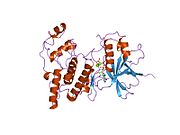
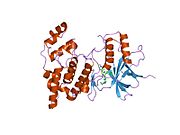



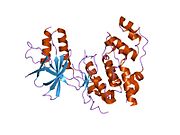
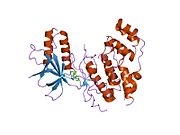



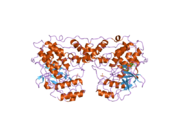
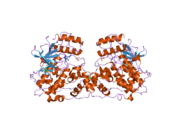
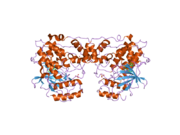
![2o0u: Crystal structure of human JNK3 complexed with N-{3-cyano-6-[3-(1-piperidinyl)propanoyl]-4,5,6,7-tetrahydrothieno[2,3-c]pyridin-2-yl}-1-naphthalenecarboxamide](http://upload.wikimedia.org/wikipedia/commons/thumb/f/f1/PDB_2o0u_EBI.jpg/180px-PDB_2o0u_EBI.jpg)

